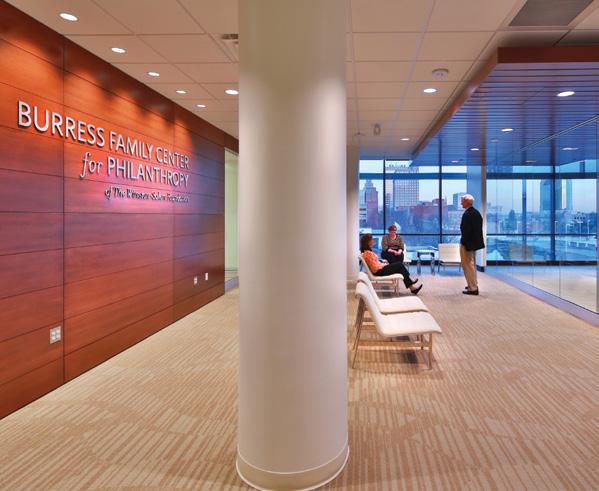
































2024 Report to the Community
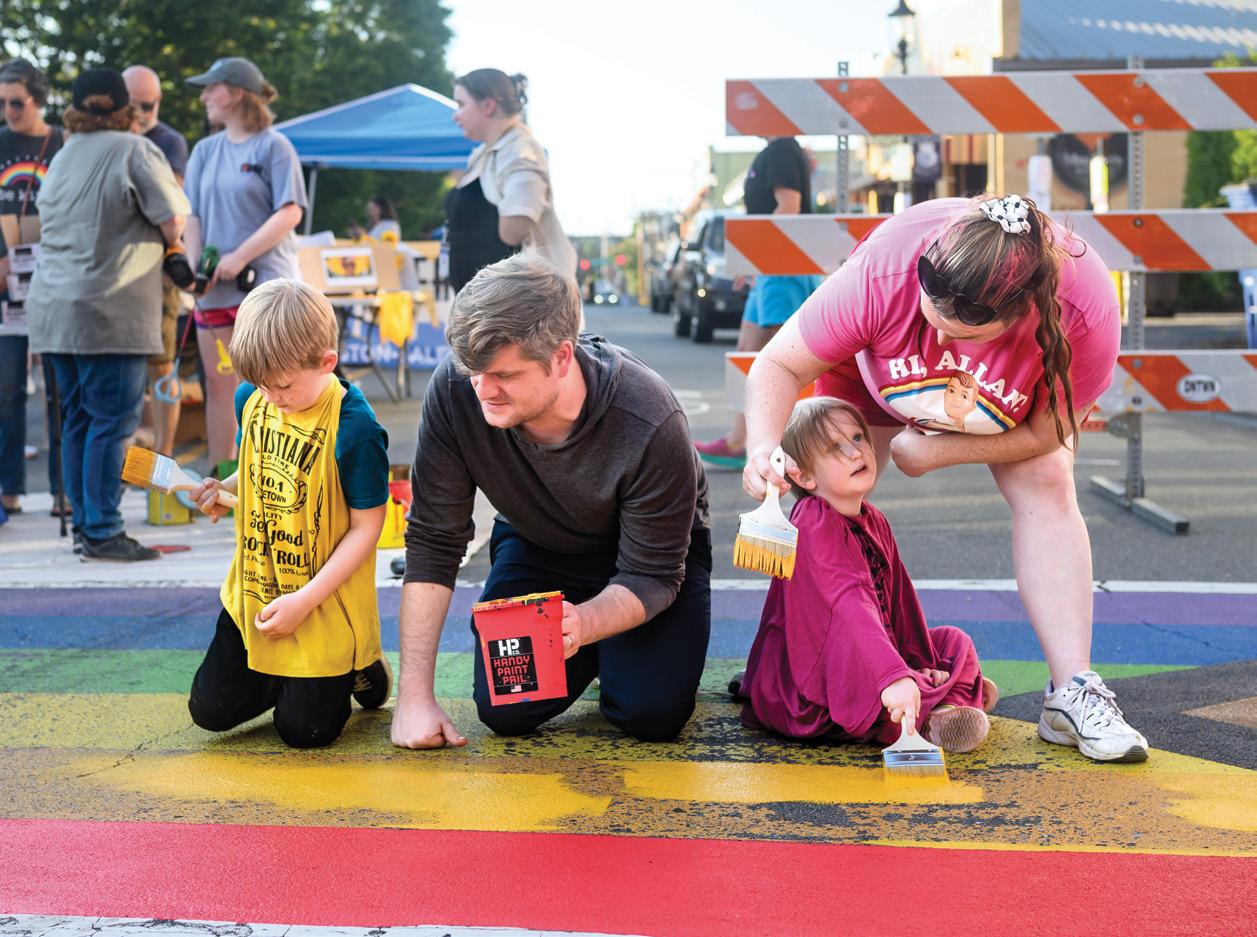
OUR MISSION is to inspire giving and link resources to action, strengthening Forsyth County—now and forever.
WE ENVISION a generous and trusting community where everyone is thriving.
WE VALUE inclusion, accountability, and continuous learning.
WE EMBED diversity, equity, and inclusion throughout our culture, systems, and practices.
We see the building blocks of a strong and vibrant community all around us—it’s evident throughout our work with donors, nonprofits, and community leaders. In the past year alone, we have seen several nonprofit infrastructure projects come to fruition, including the Metropolitan Village workforce housing project and Senior Services’ Generations Center which you will read about in this report. We’re proud to support highly collaborative and innovative efforts that emerge from local community builders and benefit so many of our neighbors.
We believe in the power of community. One person or one organization can make a difference—but neither alone can build a community. From our roots in tobacco and textiles to present innovations in education, health, and technologies, we are proud champions of Winston-Salem and the resilience of our people who continue to redefine what it means to thrive here.
We know philanthropy can be a powerful tool for change. We’re privileged to work with generous individuals, families, and companies to maximize the impact of their giving and build endowments to fuel the extraordinary nonprofits that create a safety net and sustain vital community assets.
We envision what Winston-Salem can become when all of our neighbors have the resources they need to thrive. Joining together, we can make our community an even bet ter place to live, work, learn, and play by addressing deeply entrenched barriers and harmful disparities that are holding us all back.
We are your community foundation, and we pride ourselves on bringing together people with a variety of interests and perspectives who share a commitment to this community. We help you support the causes and organizations you care about most. You help us address pressing concerns and seize emerging opportunities. Together, we ensure resources are available for future generations to imagine what’s next for Winston-Salem.
And we’re excited about future possibilities for what we can build together. Our board and staff are engaged in setting a strategic direction for our next five years. Community, philanthropy and equity anchor us and shape our understanding of what it means to be your community foundation. Your continued partnership and insightful feedback through recent focus groups, interviews, and surveys have been immensely valuable to us. Your experiences will help shape our strategic direction, and we look forward to sharing our results in the new year.
LaTida Smith President
The Winston-Salem Foundation
Alison Ashe-Card Chair
The
Winston-Salem Foundation Committee
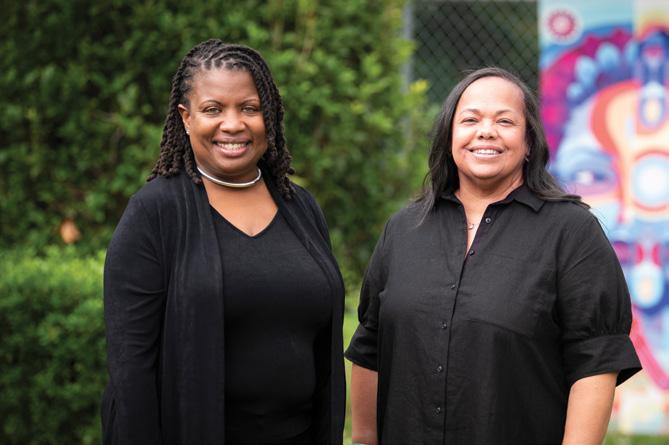
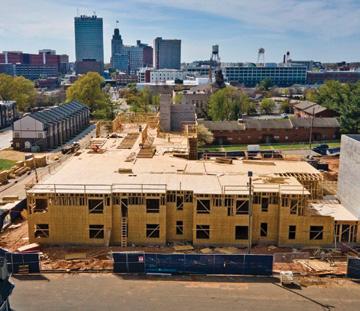
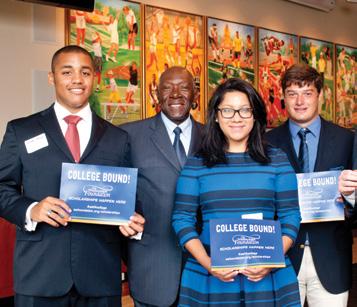
We spent this year celebrating 100 years since generous community members first joined together to support students in their quest for higher education. In October 1923, donations poured in from across the city to memorialize Leo Caldwell, a young athlete whose life had been cut short during a high school football game.
In the years since, we estimate that our scholarship funds have helped more than 18,000 local students pursue higher education. For the 2023-2024 school year, we awarded $1.5 million in scholarships to 643 local students.
In 2023, the Foundation committed more than $5.5 million in grant funding to support a wide variety of nonprofits, community groups, educators, and youth-led projects in Forsyth County. Through the Burress Family Center for Philanthropy, we hosted hundreds of nonprofits and community groups for gatherings that support their missions.
In March, we made a $1 million equity investment in Metropolitan Village, an affordable workforce housing project in Winston-Salem’s East End neighborhood, which adds significant investment in an area that has been negatively impacted by a history of redlining, displacement, and disinvestment.
And at the state level, we collaborated with fellow North Carolina community foundations to fund a transfer of wealth study that explains shifting local and state demographics to help inform and strengthen donor stewardship strategies for the broader nonprofit sector.
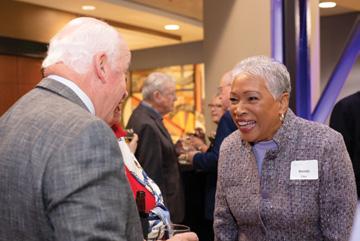

Our staff and board are working toward a new strategic plan, with an emphasis on what roles the Foundation will play in addressing our community’s biggest challenges and opportunities over the next five years. To inform our process, we conducted several listening sessions with diverse stakeholders and partnered with the Center for Effective Philanthropy to survey our donors.
We’re also thrilled to be launching a new Fund Portal and Grants Portal so our donors and nonprofit partners can spend less time navigating software and more time supporting our community. This change is the result of feedback we’ve heard directly from our partners, and we’re excited to migrate to a platform used by more than 75% of community foundations across the country.
Our November Legacy Society Gathering highlighted our student aid program, including remarks from scholarship recipients David Maize and Rev. Dr. Randell A. Cain, Jr.
In April, a coalition of community partners brought Dr. Bettina Love to Union Baptist Church, where she emphasized the importance of building an education system that celebrates and nurtures all students. Attendees also viewed Rooted in Race, an exhibit exploring local school desegregation policies and firsthand stories from community members, curated by our funded partner, Triad Cultural Arts.
Our May Professional Advisor Breakfast included networking and a panel discussion to celebrate the philanthropic legacy of the late Joyce Kohfeldt.
We also partnered with Bookmarks and other local foundations in May to hear Matthew Desmond speak on his book Poverty, by America—particularly how to address systemic issues through community involvement, voting, and local politics. We were honored to display our Undesign the Redline exhibit for attendees to learn about Winston-Salem’s history of redlining and how it still impacts our community today.
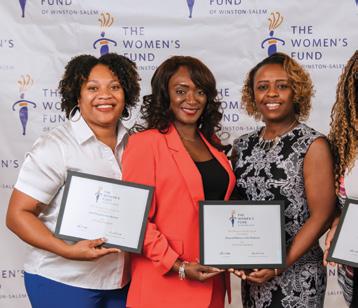
Our Strategic Initiatives give voice, leadership, and decision-making to people who have historically been left out of philanthropy. Highlights include our Youth Grantmakers in Action working together to develop grant guidelines, solicit grant proposals, and award $7,020 in grants to local youthled projects.
The Black Philanthropy Initiative galvanized new donors through its 3-year, $2 million campaign to advance Black-led community change and released its second research report,
The Intersectionality of Black Life & Being, in collaboration with Action4Equity and Forsyth Futures.
The Women’s Fund demonstrated the power of collective giving alongside more than 400 community members at its 18th Annual Luncheon Celebration, awarding $135,000 in grants to organizations working to improve the lives of local women and girls.
In this excerpted Community Matters blog post, staff members Edna Barker and Kesa Jessup reflect on the impact of the Foundation’s student aid program in its centennial year, and they share why they’re passionate about helping local students achieve their dreams of attending college.
What makes the Foundation’s scholarship program unique from other scholarship providers?
Kesa: The Foundation’s student aid program is 100 years old, so it’s very established in our community, and it also has an intergenerational pull. We answer phone calls from grandmothers who received a college scholarship and want to learn about support for their grandkids. There are generations of mothers, fathers, sons, and daughters who have all been Foundation scholarship recipients. And because we’re a community foundation, our donors are often local or have a past connection to Winston-Salem.
Edna: The Foundation is community-based, and we’re focused on students in Forsyth County and the surrounding areas. And we also offer a lot of hands-on support. Students can call us, parents can call us, and we make every effort to answer their questions and help them.
Tell us about the history of the student aid program and how the program has changed alongside the higher education landscape.
Edna Barker is the Foundation’s Student Aid Manager.
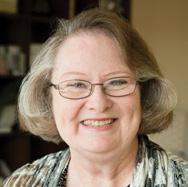
Kesa Jessup is the Foundation’s Program Director, Access to Postsecondary Education.
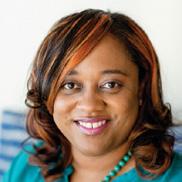
Edna: Our student aid program has really evolved since it was founded in 1923. Many people don’t know that we started out as a loan program, and over time, we also began to provide scholarships. In 2013, we discontinued the loan program to focus on providing scholarships to eliminate students’ burden of paying back loans after graduation. Over time, our technology has also evolved to reflect current needs. When we developed our online one-stop scholarship application around 2008, that allowed us to serve even more students and made it easier for students to apply for scholarship support. We now have 150 scholarship funds, and without technology we couldn’t do today what we did back then.
Kesa: When our student aid program was founded in the 1920s, loans were so commonplace. Programs like Social Security didn’t exist yet. Loans were a way to say, “We’re going to help you, but you’ve got to have some skin in the game.” The narrative of “picking yourself up by your bootstraps” is so common in American culture, when at times,
we all need support from our community. Until the federal government became more involved in providing Pell Grants and student loans in the 1960s and ’70s, students and families who couldn’t afford the up-front cost of college had to lean on loan programs like the Foundation’s. And college used to be exponentially less expensive. You could take out a loan to completely cover the cost of college and pay it back relatively quickly. But around 2012, costs began to skyrocket, and students were receiving loans as a part of a larger financial aid package, having to find additional support to pay for books, room and board, and other expenses.
What do you love most about connecting local students with scholarships?
Edna: I love getting to help students pursue all kinds of paths to get an education and reminding them that community college degrees are just as important as a 4-year degree. We often see that students pursuing 2-year degrees are even more embedded in the community— they’re going to class, they’re working a job, they may be living with family and caring for siblings, all while trying to complete their education. I can think of so many incredible students we’ve helped, and it’s also exciting when we’ve been able to impact entire families with our scholarships.
Kesa: I can say from my 15 years of experience in higher education that it’s not always the smartest students that graduate from college. It’s the students who have a community rallying around them, supporting them to say, “You can do it, you are worthy.” I love that many of our scholarship recipients see us as part of their cheerleader ring. I think that when you give someone a scholarship, you’re saying, “I believe in you, I want to see you go the distance.” And with that support, many of these students go on to do the most amazing things, and they also find ways to give back to those around them.
“When you give someone a scholarship, you’re saying, ‘I believe in you, I want to see you go the distance.’”
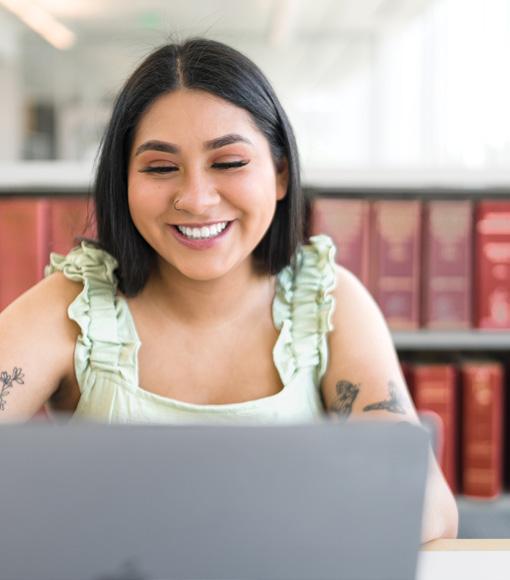
Want to learn more about the impact of our student aid program? Visit wsfoundation.org/sa100
TOTAL ASSETS* $662,889,268 CHARITABLE FUNDS* 1,677 GIFTS $38,715,598 DONORS 1,515
*as of 12/31/23
2023 ASSETS (by fund
TOTAL CHARITABLE GRANTS
$83,250,706
ORGANIZATIONS SUPPORTED
2,040
DONOR-DIRECTED (93.4%)
Grants advised by donors to support local and nonlocal organizations
FOUNDATION-DIRECTED (6.6%)
Grants the Foundation activates to strengthen Forsyth County
STUDENTS & TEACHERS SUPPORTED
696
We’re committed to growing Foundation-directed resources to be able to respond to Winston-Salem’s opportunities and challenges, both now and in the future.
To learn more about directing your giving locally, contact us at giving@wsfoundation.org or call (336) 725-2382
For more detailed financial information, visit wsfoundation.org/financials
Building a strong community takes all of us, and the Foundation is proud to serve as a bridge builder for people who are proactively making a difference in our community.
We listen to understand donors’ motivations and offer flexible options and insights to guide how they give back and make the most of their generous giving. We seek to understand what nonprofit leaders need as they build a better future for our community, especially on efforts that give local families and students more stability and resources to dream bigger.
In partnership, we look for ways to bring people together across races, backgrounds, and neighborhoods, direct resources to meet community needs, and ensure everyone has the freedom and ability to care for their families and each other.
We strengthen our community in 4 broad ways
With deep roots in Forsyth County, we help channel resources to make the greatest impact on local opportunities and challenges as they change over time. We support individuals, families, nonprofits, and companies to establish funds, create planned gifts, and invest in the causes that mean the most to them.
Donor-Advised Funds to support charitable causes, now or in the future
Permanent Funds to ensure lasting community impact
Scholarship Funds help students pursue their dreams. Designated Funds support specific nonprofits.
Unrestricted and Field of Interest Funds support the Foundation’s work in addressing local challenges. Organizational Endowment Funds are established by nonprofits, providing long-term financial support to fulfill their mission.
Nonprofits are the backbone of our community, providing services and opportunities that would otherwise not exist. We make grants to a wide variety of charitable organizations serving greater Forsyth County in areas including community development, the arts, health, education, human services, and beyond.
Capacity-Building Grants for internal operations
Capital Improvement Grants for capital investments
Small Grants for smaller groups and organizations
We proactively seek opportunities to make our community an even better place to live, work, learn, and play. Together with our community partners, we strive to eliminate inequities and solve complicated community problems by addressing root causes.
Focus Area Grants to advance equity in education and build an inclusive economy
Impact Investments to make strategic financial investments in local businesses and organizations working for social change
Black Philanthropy Initiative Grants to build economic security and address educational inequities in Black communities
The Women’s Fund of Winston-Salem Grants to provide economic opportunities for local women and girls
We help ensure all of Winston-Salem’s students can learn in a supportive environment and have what they need to pursue their dreams. We strengthen education locally by providing funding for educators and youth-led service projects, and by giving scholarships to students.
Scholarships for post-secondary education
Teacher Grants for professional development
Youth Grantmakers In Action Grants to youth-led groups
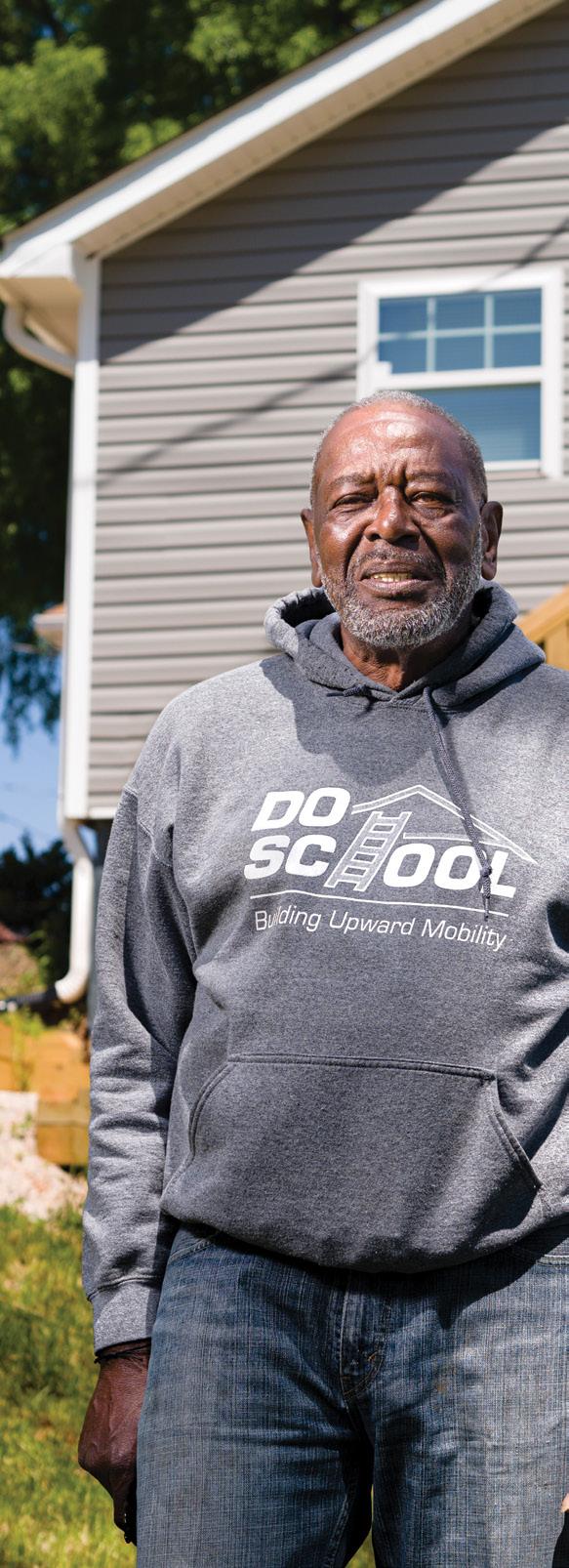
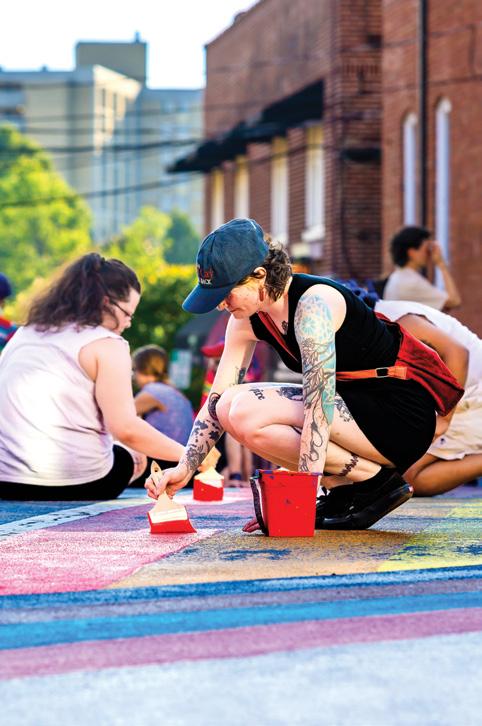
As a community foundation, we shine a spotlight on community strengths and possibilities to honor the extraordinary things local residents do every day to make life better for those around them.
On the following pages, you’ll read about just a few of the hundreds of people and organizations we collaborate with to strengthen Forsyth County.
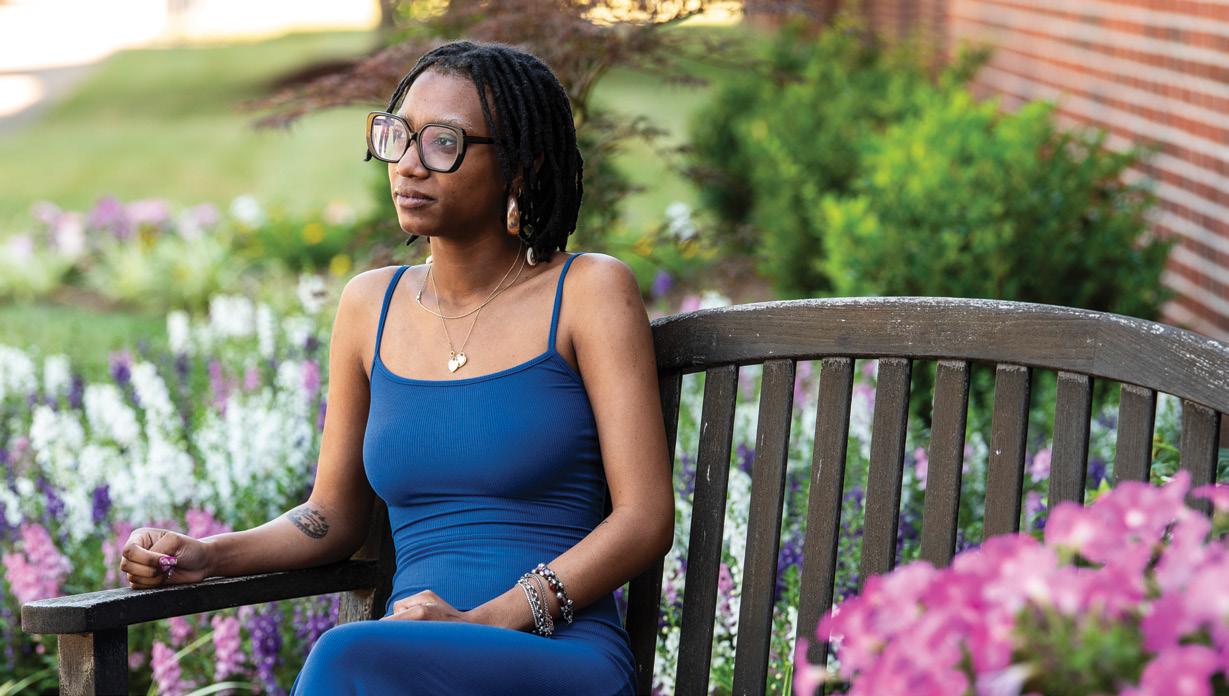
CLARK CHAVOUS
Born and raised in Winston-Salem, Clark Chavous has always had a deep love for her hometown and its people. “Mom was big on church and volunteering growing up,” she reminisces. “So, I tagged along, lending a hand wherever I could. School, too, was full of activities and programs that kept me involved and connected.”
Winning the North Carolina COVID-19 vaccine lottery in 2020 came as a complete shock. She discovered her win by checking her email after a long day’s work. “At first I was awestruck, but I was quickly compelled to do something charitable with the winnings and use my platform to advocate on behalf of my community.”
Deciding how to distribute the money to charitable causes wasn’t simple. That’s when she turned to The WinstonSalem Foundation for help. “From my very first meeting with the Foundation staff, I could tell that everyone genuinely cared about what they were doing. They became my guides, showing me how to make a difference in my community. I’ve learned a lot from them and built a strong trust.”
To Clark, philanthropy isn’t just about giving money—it’s about using her voice to inspire and uplift others. “Through interviews and public appearances, I learned to speak up for what I believe in, and I hope to inspire others to do the same.”
Through her partnership with the Foundation, Clark made a significant gift to the Black Philanthropy Initiative and established a scholarship fund for African American students who attend historically Black colleges and universities (HBCUs). “I felt inclined to focus my giving in a way that strengthens Black communities in Winston-Salem.”
As she approaches her final year at Fayetteville State University, Clark is eager to continue building up the community around her and take the next steps to grow her career as a family and marriage counselor. “This journey has given me many powerful opportunities and the chance to meet great people who also care deeply about WinstonSalem. With the lessons learned and the connections I’ve made, I’m determined to keep making a positive impact in my community.”
“The Foundation helps us prioritize and discover new giving options, so we can get right to the act of supporting community needs.”
BOB AND LISA GFELLER
Originally from different parts of the country, Bob and Lisa Gfeller found each other in mid-1980s New York City. In 1988, a job offer from RJR Nabisco’s Planters & Lifesavers Company relocated them to Winston-Salem, where they decided to put down roots and raise a family.
Their philanthropic journey with The Winston-Salem Foundation began decades later, after a tragic event in their lives. Lisa recounts the heartbreaking loss of their son Matthew in 2008. “It was just a few days after Matthew’s fatal traumatic brain injury during his R.J. Reynolds High School football game when we were told that people wanted to honor his life and memory in a significant way.”
A compassionate neighbor suggested the Foundation as a resource to quickly establish a fund in Matthew’s name. Donations poured in from the community and led to the creation of the Matthew Alan Gfeller Memorial Scholarship, providing scholarships to RJR High School seniors who exemplify Matthew’s spirit and passion for athletics. The Matthew Gfeller Foundation was also born, raising awareness and funding research to prevent and treat youth sports-related traumatic brain injuries through 2016. Today, this mission continues through the Matthew Gfeller Center at UNC-Chapel Hill.
The Gfellers’ partnership with the Foundation grew over the years, as they sought guidance, resources, and connections to amplify their impact. “The Foundation gave us a catalyst to focus our efforts,” Bob emphasized. “Our Gfeller Family donor-advised fund continues to be a valuable tool for our giving. We’ve been able to quickly mobilize dollars to support efforts like the Black Philanthropy Initiative and honor loved ones through memorial gifts.”
As a member of The Women’s Fund of Winston-Salem, Lisa enjoys collaborating with other passionate donors to vote on grants and learn about community issues. “I’m proud to be part of a network that supports women and girls. It’s a remarkable resource and helps me stay plugged in to needs that align with our family’s giving goals.”
Now that their children are grown, and they’ve become grandparents, the Gfellers see the Foundation as a vital resource for continuing their philanthropic legacy as a larger family. “Their dedicated staff always know right where the needs are,” Bob remarked. “The Foundation helps us prioritize and discover new giving options, so we can get right to the act of supporting community needs.”
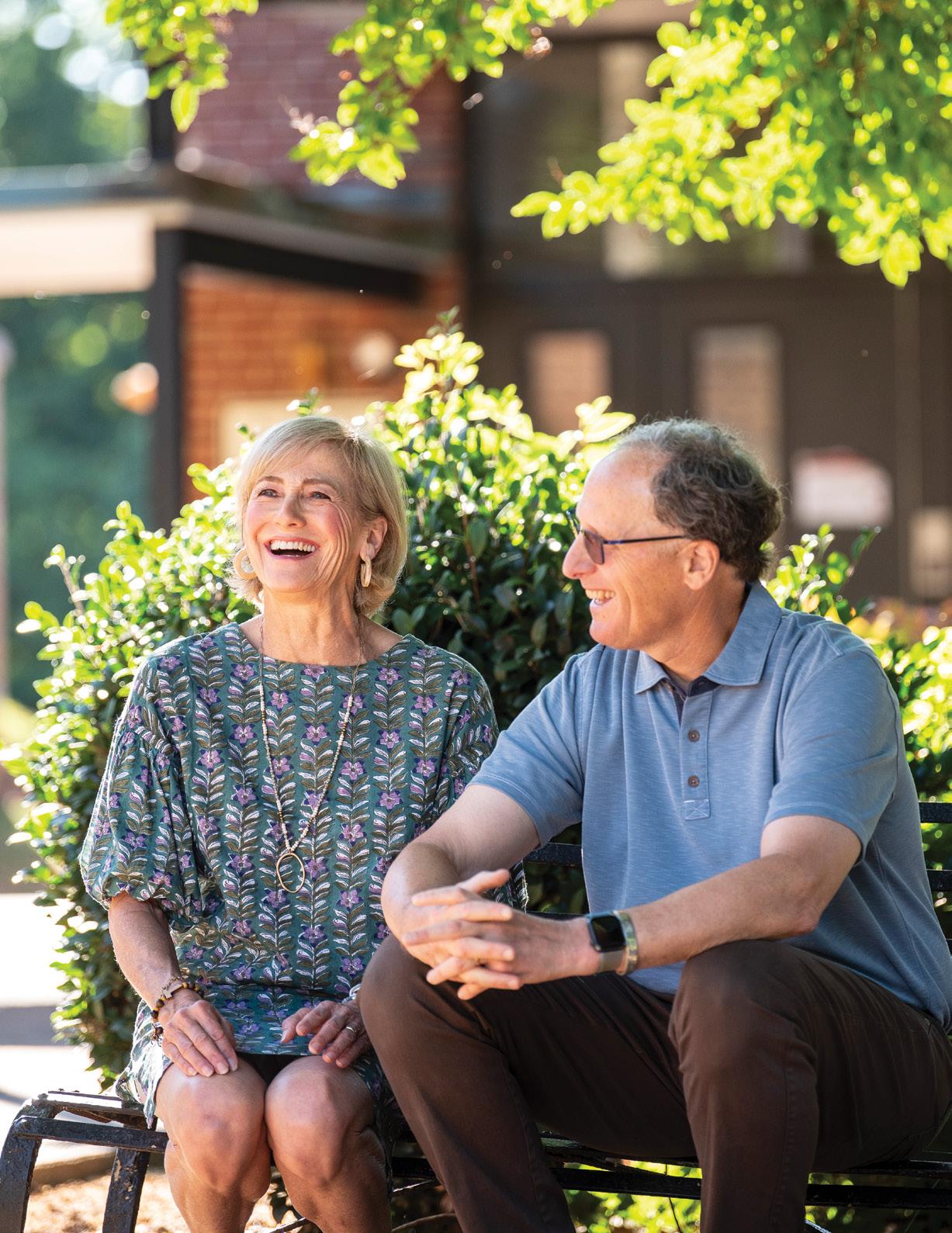
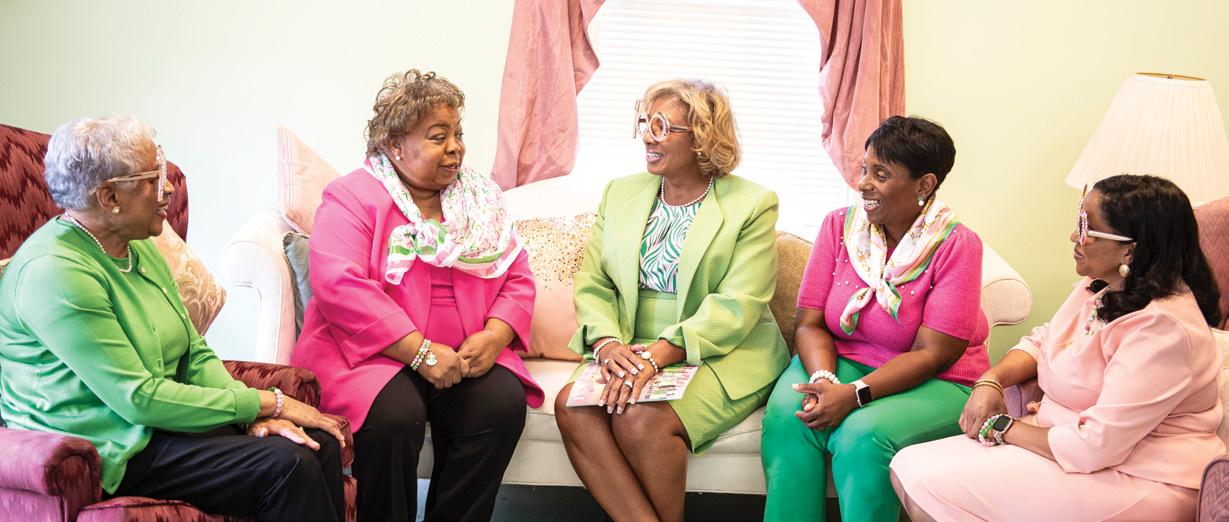
Founded on the campus of Howard University in 1908, Alpha Kappa Alpha Sorority Inc. is the country’s oldest sorority for college-educated African American women. Annette Wilson, who is fondly referred to as a “walking encyclopedia” on the sorority’s history, emphasized its impact on her upbringing. “Our sorority is not just about college years; it’s a lifelong commitment to service and leadership,” Annette explained, her eyes reflecting pride. “I saw the contributions that AKA members made in our local community growing up, including my mother and my aunt—I wanted to be part of that legacy.”
Winston-Salem’s own Phi Omega Chapter celebrates 100 years of service this year—a sisterhood of more than 250 local women who are driven by their commitment to service and caring for others. Brenda Diggs underscored the importance of the village within African American communities and her sorority’s role in fostering it: “AKA women truly model what service looks like, what it means to be part of a village and to take care of one another.”
The Phi Omega sisters sought a way to celebrate their centennial by supporting one of their signature initiatives—providing scholarships for young African American women seeking a college degree. The group collectively
decided to reach out to The Winston-Salem Foundation for support in establishing a charitable fund. “Partnering with the Foundation gave instant credibility because of its strong reputation in the community,” Brenda shared. “The Foundation staff are such a resource for us, from brainstorming about our options, to providing tax statements to donors, to handling and processing gifts.”
With donations from members of Phi Omega and community friends, the sorority created the Phi Omega Centennial Scholarship and Community Grant Fund. “We’re excited to celebrate this milestone year in a way that reflects the vision of our sorority’s founders,” shared chapter president Evelyn Acree. “It’s our hope that the fund will make a significant difference in the lives of deserving students and community members, empowering them to reach their fullest potential.”
Evelyn asserted passionately, “We want future generations to say that the members of the Phi Omega Chapter, the oldest chapter established in North Carolina, cared deeply about educating young African American women and addressing the needs of our community. If we can help in any way to improve the quality of life, to make a positive difference, that’s what our sisterhood is all about.”
KIM STOGNER
At a Foundation gathering earlier this year, distinguished attorney Kim Stogner (Womble Bond Dickinson) stood before a room of professional advisors to offer insights about her experience supporting charitable clients. Kim’s legal expertise and keen ability to build trust was evident as she reflected upon her partnership with prolific philanthropist Joyce Kohfeldt, noting, “I’ve been practicing law for 30 years now, and clients like Joyce make what I do truly meaningful.”
Many nonprofit leaders in our community have a unique story about the late Joyce Kohfeldt, namely her passion for giving her time and treasure to advocate for those who need it most. As a former educator and owner of a school supply company, Joyce understood the transformative power of education and the importance of ensuring every child has access to resources and quality learning opportunities.
Kim and Joyce began working together back in 2008, as Joyce was settling her mother’s estate. Joyce shared her interest in wanting to be generous to others. Kim pointed Joyce to The Winston-Salem Foundation, reflecting, “It was easy for me to introduce Joyce to folks at the Foundation, so they could provide direction to help her make the biggest impact.”
Through the Foundation’s expertise and support, Joyce channeled her resources into the creation of several charitable funds, including the Joyce Kohfeldt Designated Fund, which provides perpetual income to support beloved organizations like Crosby Scholars, Goodwill Industries of Northwest North Carolina, Lutheran Church of the Epiphany, Ronald McDonald House Charities of the Piedmont Triad, and Second Harvest Food Bank of Northwest NC.
Kim’s partnership with Joyce demonstrates the enduring bond that many charitable people share with their trusted financial advisors and how conversations about philanthropy can often lead to a deeper level of trust. Through Kim’s guidance, Joyce Kohfeldt and countless others have found avenues to make a meaningful difference, leaving behind legacies that will continue to strengthen our community for years to come.
“It was easy for me to introduce Joyce to folks at the Foundation, so they could provide direction to help her make the biggest impact.”
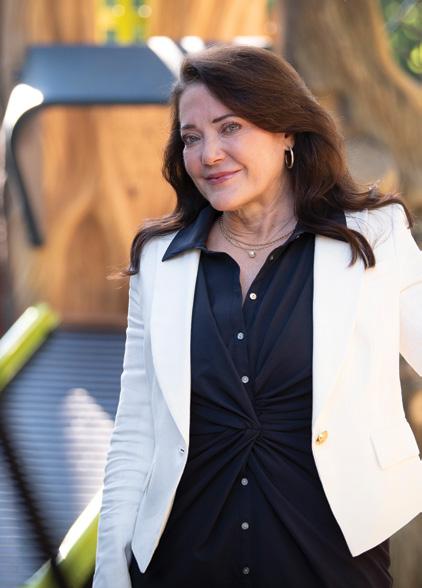
“Collaboration with the Foundation goes beyond grant funding— it’s about building a lasting relationship with a shared vision for community change.”

As the largest higher education institution in Winston-Salem, Forsyth Technical Community College exemplifies the power of collaboration and innovation in realizing students’ dreams. With a mission to promote economic mobility, Forsyth Tech’s vision extends beyond individual success stories.
Amy Ball Braswell, executive director of strategic initiatives, and Dr. Stacy Waters-Bailey, vice president of transfer excellence and success, reflected on their efforts with The Winston-Salem Foundation to support students’ holistic needs. “Working in the grants office, I learned about the Foundation’s focus on building an inclusive economy and supporting affordable transportation initiatives,” Amy said. “Transportation was a big issue for students.” Stacy stressed the importance of understanding students’ challenges beyond the classroom. “We have to think about the family as a whole because what happens at home impacts learning.”
Grant support from The Winston-Salem Foundation helped Forsyth Tech identify how transit and school schedule misalignment creates barriers for low-income students. Their work uncovered important insights. “We thought free bus passes alone would solve the problems, but that wasn’t the case for all students,” Amy admitted. They responded with additional solutions, including gas cards and a fund to help students make car repairs, addressing a broader range of transportation challenges they uncovered.
Amy shared an appreciation for the Foundation’s flexibility through the COVID-19 pandemic and beyond, helping the college pivot and center students at every turn. “Collaboration with the Foundation goes beyond grant funding—it’s about building a lasting relationship with a shared vision for community change,” Amy said. “Their team understands local challenges from a unique perspective.”
Indeed, Forsyth Tech graduates play a crucial role in bolstering our local economy. Leaders like Amy and Stacy help ensure even more students are set up for future success. “I hope future generations see Forsyth Tech as a place of promise,” Stacy added with optimism. “By loving and serving every student to success, we are building a stronger, more resilient community that benefits us all.”

Since its grand opening in November 2023, the Intergenerational Center for Arts and Wellness (Generations Center) has served as a vibrant hub where individuals of all ages can come together to celebrate creativity and well-being. Born from the collaborative efforts of Senior Services and several partners, this visionary center stands as a testament to the transformative power that the arts can play in people’s everyday lives.
Lee Covington, president and chief executive officer, reminisced about Senior Services’ humble beginnings in 1962, when Meals-on-Wheels was launched by a group of local women. Over the years, its mission expanded to encompass a range of services aimed at helping older adults to age with dignity and live with purpose.
The journey toward creating the Generations Center began in 2016 with the inception of the Aging with Purpose program. Through partnerships with Kindermusik International, local artists, and UNC School of the Arts, Senior Services witnessed the profound impact of connections forged through music and art, and between the generations.
By early 2018, discussions with Family Services and Sawtooth School for Visual Art gave rise to the ambitious vision of a comprehensive center that would foster regular interactions between young people and older adults. Today, the 62,500-square-foot facility includes programming and services from 21 organizations and is designed to be welcoming to everyone, especially older adults. Support from donors across the community and a grant from The Winston-Salem Foundation helped make this dream a reality.
Renee Griffin, creative aging and partnerships officer, underscored the importance of fostering relationships across generations: “Research shows that our whole community thrives when we have trusting relationships with people of different generations. Appreciating each other’s life experiences and perspectives truly makes our communities stronger and healthier.”
Looking to the future, Senior Services envisions a community where aging is celebrated, not feared, where understanding between generations is fostered. “We hope people will see growing older as a normal, valuable part of life—something to be embraced and celebrated,” Renee said.
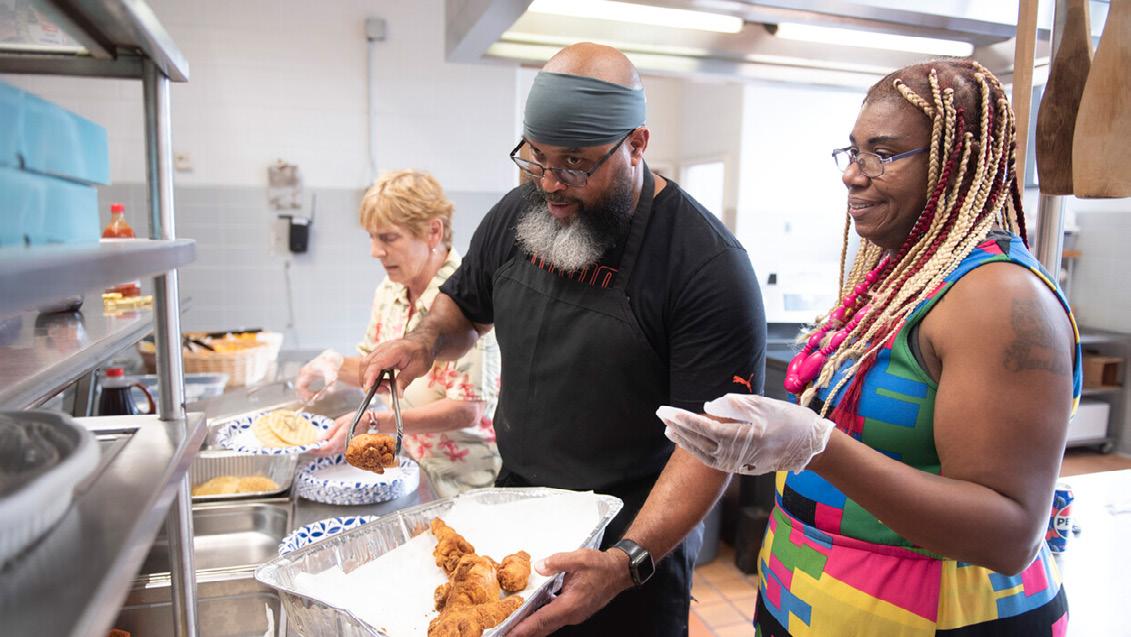
Some might say the story behind Smiley’s Sweets Foundation is bittersweet, but founder and executive director Cheresse Davenport tells it with a lot of heart, sharing, “It all started with a promise to my daughter to continue spreading kindness like she always did.” The organization was founded in 2022 in memory of Cheresse’s beloved daughter, Latisha Alston, known to all as “Smiley” for her radiant spirit. Smiley’s Sweets carries this kindness forward by providing resources, guidance, and opportunities for young people and their families.
Starting in a small apartment in the Piedmont Circle neighborhood, Smiley’s Sweets quickly grew. “Back then, we served 80 to 100 children daily with home-cooked meals, teaching the importance of healthy eating,” Cheresse said. A grant from the Black Philanthropy Initiative was an early acknowledgment of Cheresse’s unique vision for community engagement. “With more support, we were able to add classes with parents, providing supplies like air fryers and utensils to encourage healthy eating at home.”
As the organization’s programs expanded, Smiley’s Sweets was invited to move its headquarters to First Christian Church on Country Club Road. A grant from the Foundation helped the organization purchase furniture and equipment for the space, as well as a van to provide transportation for program participants. Reflecting on the support from the Foundation and BPI, Cheresse remarked, “Y’all care. Your team is hands-on and involved. That’s what makes the Foundation special.”
Through collaborations with nonprofits like Mixxer Community Makerspace, Habitat for Humanity, and H.O.P.E. of Winston-Salem, the organization offers a wide range of activities, including podcasting, photography, welding, and carpentry—all centered on helping young people thrive and find their unique voice.
“As adults, sometimes we think we know what’s best for youth,” Cheresse said. “Smiley’s Sweets wants youth voices to be heard. We want to create a safe space where they can express their thoughts and feelings, to be part of the change they want to see in their communities.”
World Relief is an international Christian humanitarian organization that addresses global crises in partnership with local churches and communities. Established in 1989 in High Point and expanded to Winston-Salem in 2015, World Relief Triad has been resettling refugees and providing vital services to immigrant families for more than three decades.
The refugee resettlement process handled by World Relief Triad is comprehensive and compassionate. This journey of refugee resettlement is far from easy or expeditious. Not only are these families displaced from their homes, but they may wait, on average, a total of 10 years before being granted permission to come to the U.S. According to international law, refugees are individuals who are forced to flee their home country due to persecution based on race, religion, nationality, political opinion, or membership in a particular social group. “All refugees arrive on an airplane and pay their own way, by way of a travel loan that they pay back after they’re settled,” explained Jon Musser, director of church and community engagement. “Once a refugee family arrives, we help them get set up with everything they need, from housing to community support.”
World Relief Triad offers various programs to support refugees. These include a 3–8 month resettlement program that intensively cares for families, helping them secure jobs, enroll in school, and access necessary services like food assistance and employment authorization. “Our employment program helps people find jobs, overcoming challenges with transportation, language barriers, and childcare. We also provide legal services to help refugees move toward citizenship, which they’re eligible to do after 5 years,” Jon said.
Community support and engagement are critical to World Relief Triad’s mission. Grant support from the Foundation has played a significant role in expanding the organization’s bandwidth to raise funds and engage the community. “Foundation grant support has been crucial. We’re grateful for the ease of the grant application process so we can spend more time serving our community,” Jon explained.
World Relief Triad also works to change misconceptions about refugees and emphasizes the importance of viewing all immigrants with dignity. “There’s so much cultural richness in our communities when we expand our social circles. Immigrants bring immense cultural, relational, and economic gifts that benefit us all.”

“There’s so much cultural richness in our communities when we expand our social circles. Immigrants bring immense cultural, relational, and economic gifts that benefit us all.”
After reading this report, we hope you are inspired by how we can give together to make a greater impact, the variety of ways we can give beyond our wallets, and how giving where you live can make a difference for both you and your neighbors.
1
Make a donation of any size to support The Next Century Fund, Scholarships, The Women’s Fund of Winston-Salem, or Youth Grantmakers in Action.
Make a gift or pledge toward the Black Philanthropy Initiative’s $2 million campaign to Advance Bold, Black-led Community Change. Thanks to an anonymous donor, all donations are being matched up to $200,000!
Visit wsfoundation.org/give
3
Whether you’re a nonprofit, a local educator, or a student seeking higher education, we have ongoing grant and scholarship opportunities to help support your goals.
Visit wsfoundation.org to learn more
2
Set up a Donor-Advised Fund or Designated Fund to support nonprofits that align with your philanthropic goals.
Establish an Unrestricted Fund, Field of Interest Fund, or Scholarship Fund to invest directly in local nonprofits and students.
Include the Foundation in your will or charitable gift plans.
Contact us at giving@wsfoundation.org or call (336) 725-2382
4
Volunteer with the Black Philanthropy Initiative, The Women’s Fund, or as a Foundation Scholarship Reviewer.
Support our nonprofit partners with time, expertise, or donations.
Call us at (336) 725-2382 to get connected or visit wsfoundation.org/volunteer
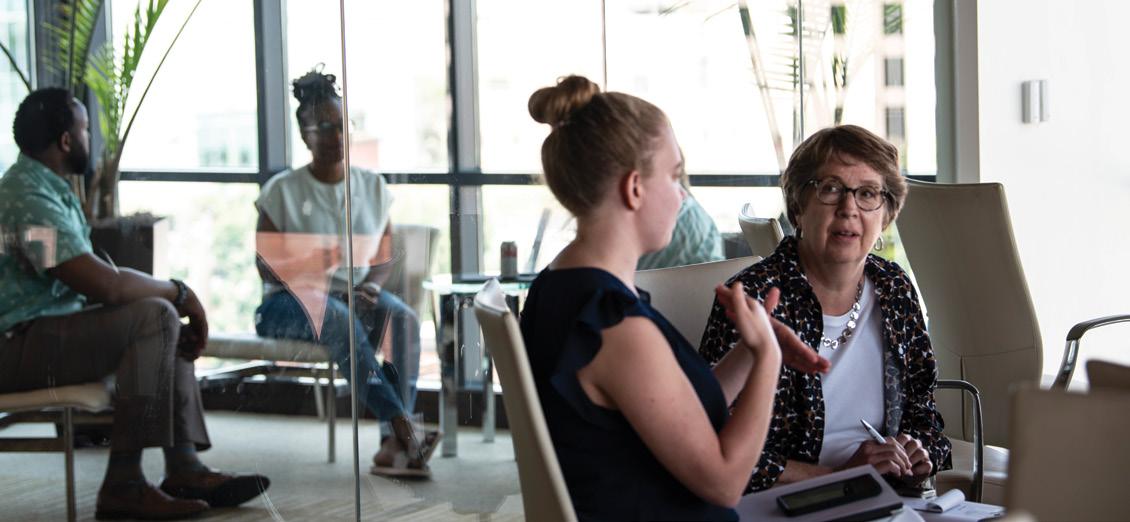
For more than 100 years, community members have partnered with us to solve pressing issues in WinstonSalem and beyond.
THE BURRESS FAMILY CENTER FOR PHILANTHROPY
Nonprofit organizations and groups are invited to use this collaborative meeting space to learn, connect, and share ideas. The Foundation is pleased to have hosted more than 2,000 community meetings in this space since it opened in 2015.
For more information on the facility, visit wsfoundation.org/meeting-space
Our board and staff are passionate and dedicated because we love this community, and we want to create a long-lasting legacy of impact with you.
Please reach out if you have questions or want to learn more about the work of the Foundation. Together, we can accomplish our vision of a thriving Forsyth County for all.
Get in touch at wsfoundation.org/staff
Read about our dedicated board at wsfoundation.org/board
